
The World Health Organization (WHO) this week warned that severe disruption of the global supply of personal protective equipment (PPE) is endangering lives already at risk by COVID-19 and other infectious diseases as reports of equipment hoarding, crisis profiteering, and general misuse have come to light.
The organization blamed a mix of rising demand, panic buying, hoarding, and misuse. Since the start of the COVID-19 outbreak last December, WHO estimates that prices of surgical masks have increased by as much as six-fold, N95 respirators tripled, and hospital gowns doubled. It creates a dangerous environment both for health workers and patients, given that supplies can take months to deliver at the best of times.
WHO Director General Tedros Adhanom Ghebreyesus said in a briefing on March 3, widespread market manipulation and the selling of stocks to the highest bidder is furthering the crisis.
“Without secure supply chains, the risk to healthcare workers around the world is real. Industry and governments must act quickly to boost supply, ease export restrictions and put measures in place to stop speculation and hoarding,” Tedros said. “We can’t stop COVID-19 without protecting health workers first.”
Many supplies have been affected so far, including gloves, medical masks, respirators, goggles, face shields, gowns, and aprons. WHO admits it has shipped nearly half a million sets of PPE to 47 countries, but that its supplies are dwindling. For the COVID-19 response alone, WHO estimates some 89 million medical masks and 76 million gloves are required each month.
As a result, the WHO has called on governments and industry to work together to increase manufacturing by as much as 40 percent. WHO is working with them, along with the Pandemic Supply Chain Network, to achieve this, and to guarantee that critically affected and at-risk countries are covered. As part of these efforts, WHO has asked that governments provide incentives such as easing restrictions on the export and distribution of PPE and other medical supplies.
This call came the same day that the World Bank committed an initial $12 billion in immediate funds for countries struggling to contain the novel coronavirus, which now affects 73 countries and has infected more than 90,000 people.




